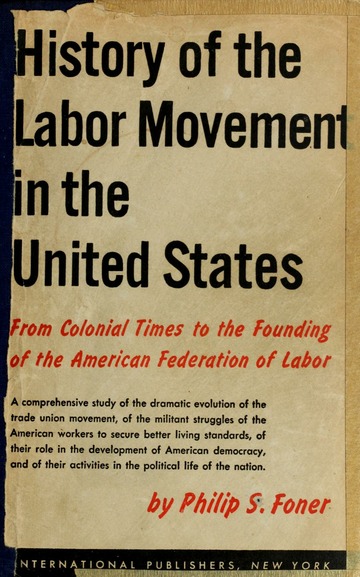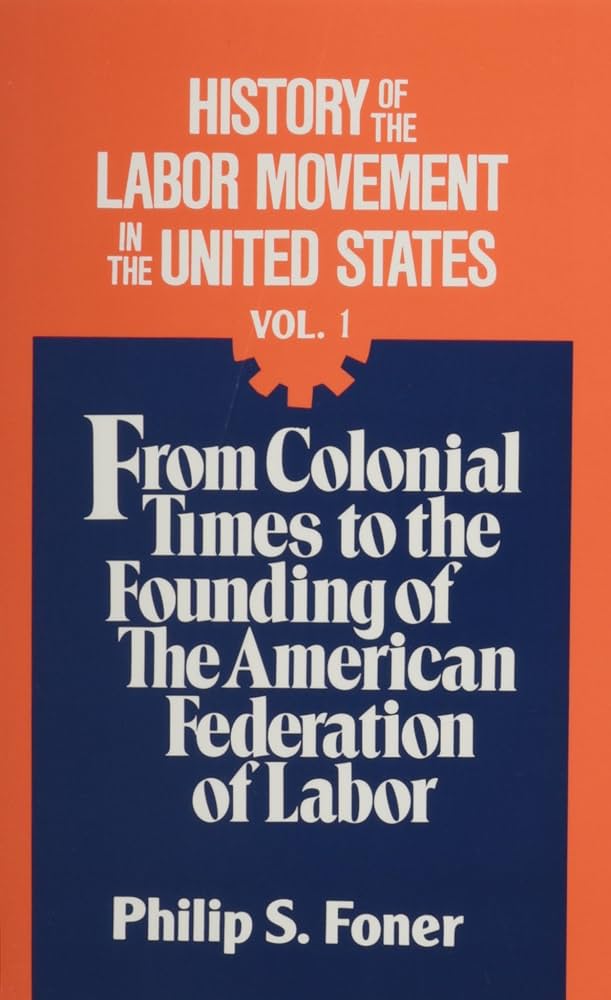Biblioteca / 1940-1949
Philip S. Foner. History of the Labor Movement in the United States. Vol. 1: From Colonial Times to the Founding of the American Federation of Labor.
Nueva York: International Publishers, 1947.
4ta reimpresión, 1972.
576 páginas.


CONTENTS
PREFACE
1 – LABOR COMES TO AMERICA
Labor Conditions in Europe
Getting to America
2 – LABOR IN COLONIAL AMERICA
Slaves and Indentured Servants
Emergence of Wage Earners
Labor Conditions and Organizations
Struggles for Democracy
3 – LABOR AND THE AMERICAN REVOLUTION
Background for Revolution
The Sons of Liberty
Political Action
The Road to Independence
The War for Independence
Victory
4 – AMERICAN INDUSTRIAL DEVELOPMENT, 1783-1880
Obstacles to Industrial Growth
Role of Transportation
Rise of the Factory System
Industrial Expansion on the Eve of the Civil War
Industrial Growth During the Civil War
Industrial Expansion After the Civil War
Trends Toward Monopoly
Crises, and Labor’s Answers
5 – EARLY TRADE UNIONS
Labor Conditions in Post-Revolutionary America
The Merchant Capitalist Enters
Temporary Labor Associations
The First Trade Unions
Union Policies and Practices
Labor and the Courts
6 – LABOR AND JEFFERSONIAN DEMOCRACY
Sources of Jeffersonian Democracy
The Democratic-Republican Societies
The Federalist Counter-Offensive
The Triumph of Jeffersonianism
Labor and the Embargo
Labor and the War of 1812
Extension of Democracy
7 – TRADE UNIONISM AND LABOR STRUGGLES, 1819-1837
Labor Conditions
Labor’s Awakening
City Centrals
National Labor Organization
The Ten-Hour Day
Labor and the Public
8 – EARLY LABOR PARTIES
The Political Awakening
The Workingmen’s Program
Philadelphia
New York
New England
Decline and Disappearance
Achievements
9 – LABOR AND JACKSONIAN DEMOCRACY
Labor’s Estimate of Jackson
The Bank War
Labor’s Role in New York
Rise of the Loco-Focos
Loco-Focoism Spreads
Achievements of the Loco-Focos
10 – THE ERA OF UTOPIANISM
Decline of the Trade Unions
Spread of Machinery
Credo of the Utopians
Owenism
Fourierism
Producers’ Co-operatives
Consumers’ Co-operatives
Land Reform
Utopian Reformers and Trade Unionism
11 – THE TEN-HOUR MOVEMENT, 1840-1860
The Revival of Trade Unionism
Factory Workers and the Labor Movement
The Ten-Hour Philosophy
New England Workingmen’s Association
Ten-Hour Strikes
Ten-Hour Laws
Decline in New England
Upsurge in Pennsylvania
Activity in the ‘Fifties
Political Action in New Jersey
Results of the Ten-Hour Movement
12 – TRADE UNIONS AND LABOR STRUGGLES IN THE FIFTIES
Labor Conditions
Local Trade Unions
Immigrant Labor
English Influences
The German-American Labor Movement
National Labor Organization
Unemployment Demonstrations
Revival of Unionism
New England Shoemakers’ Strike
Labor and Politics
13 – LABOR IN THE ANTE-BELLUM SOUTH
Slavery
Resistance
White Workers and Slavery
Slavery’s Dilemma
14 – NORTHERN LABOR AND SLAVERY
Uncertainties
Labor and the Abolitionists
Wage Slavery and Chattel Slavery
Impact of Slavery Extension
The Slaveholders’ Program
Emergence of the Republican Party
Election of 1856
Fighting Republican Conservatism
Lincoln and Labor
Election of 1860
15 – LABOR AND THE CIVIL WAR
Labor and the Secession Crisis
To Arms!
Fighting for What?
English Workers and the Civil War
Contributions of Negro Workers
16 – LABOR AND THE COPPERHEADS
Labor and the Draft
Copperhead Propaganda
Wartime Contrasts
Wartime strikes
Failure of the Copperhead Campaign
Labor Turns to Lincoln
Role of the Labor Press
Workingmen’s Democratic-Republican Association
Victory
17 – THE LABOR MOVEMENT, 1861-1866
Causes of Trade Union Revival
Women Workers
More and Bigger Unions
The Molders
The Labor Press
The Employers’ Counterattack
Labor Tightens Its Ranks
Political Action
A National Perspective
Towards an Eight-Hour Day
18 – THE LABOR MOVEMENT, 1866-1872
Founding the National Labor Union
The First Congress
Strengthening the National Labor Union
The Eight-Hour Day
Women Workers and Woman’s Rights
19 – THE LABOR MOVEMENT, 1866-1872 (continued)
Labor and Reconstruction
Organization of Negro Workers
Negro Labor Coventions of 1869
The National Colored Labor Union
20 – THE LABOR MOVEMENT, 1866-1872 (concluded)
International Labor Unity
The First International in America
The Co-operative Movement
Monetary Reform
Political Action
Decline of the National Labor Union
21 – THE BIRTH OF THE KNIGHTS OF LABOR
Rituals of the Knights of Labor
Role of Uriah S. Stephens
Early Structure of the Knights of Labor
22 – THE LONG DEPRESSION, 1873-1878
Decline in Union Membership
Persistence of Unionism
Depression Living
Unemployed Demonstrations
Lassalleans and Marxists
The Socialist Movement Unites
23 – CHALLENGING THE GREAT DEPRESSION
Textile Strikes
The Long Strike of 1875
The Molly Maguires
The Great Strikes of 1877
24 – INDEPENDENT POLITICAL ACTION, 1873-1878
The Rise of Greenbackism
Labor Parties and Greenbackism
The National Greenback-Labor Party
Chinese Exclusion
Demagogy’s Brief Sway in California
The Socialist Movement
25 – BEGINNINGS OF THE MODERN LABOR MOVEMENT, 1878-1881
Revival of Trade Unionism
The International Labor Union
The Knights of Labor
The «New Unionism» of the 1870’s,
The Cigar Makers
The Federation of Organized Trades and Labor Unions
BIOGRAPHICAL SKETCHES